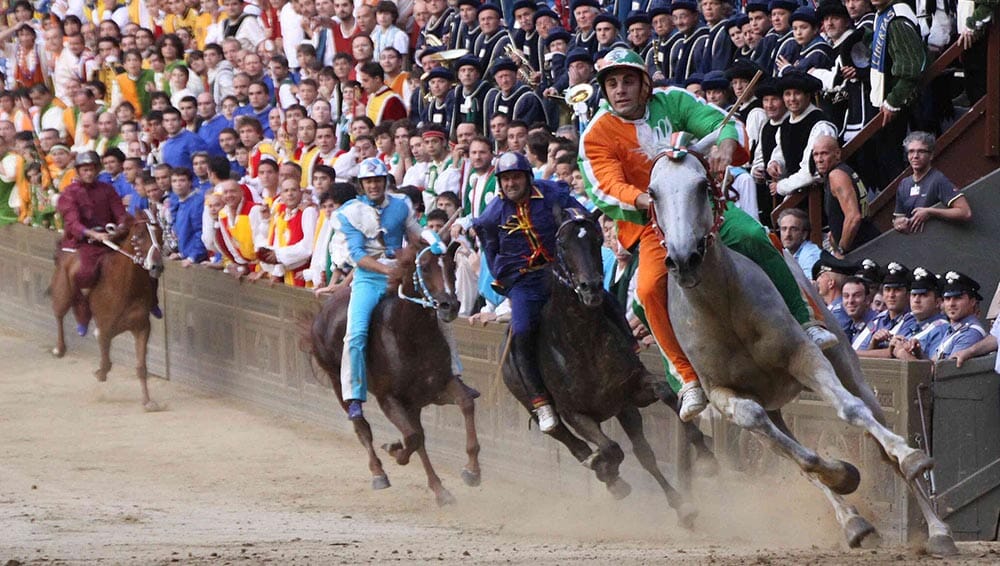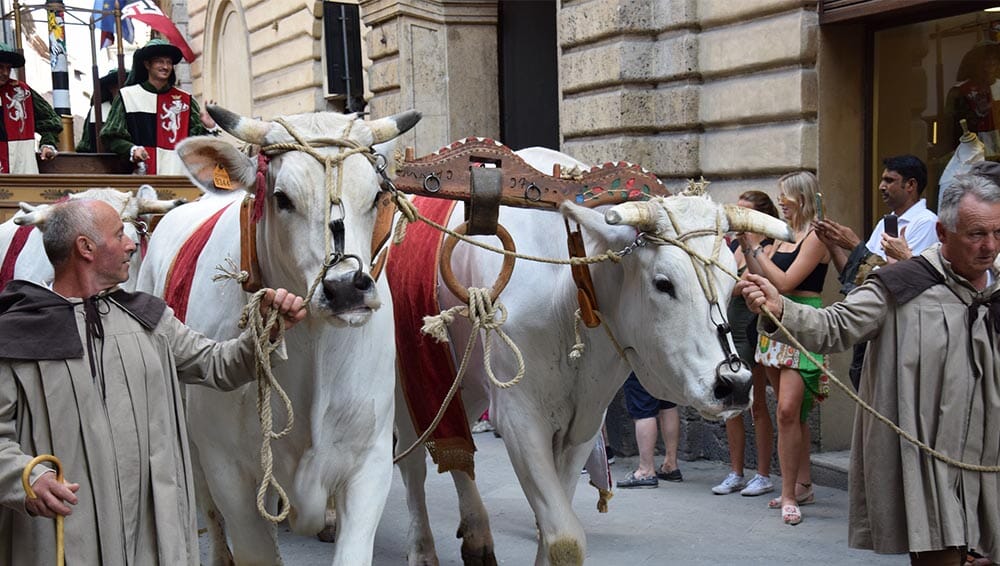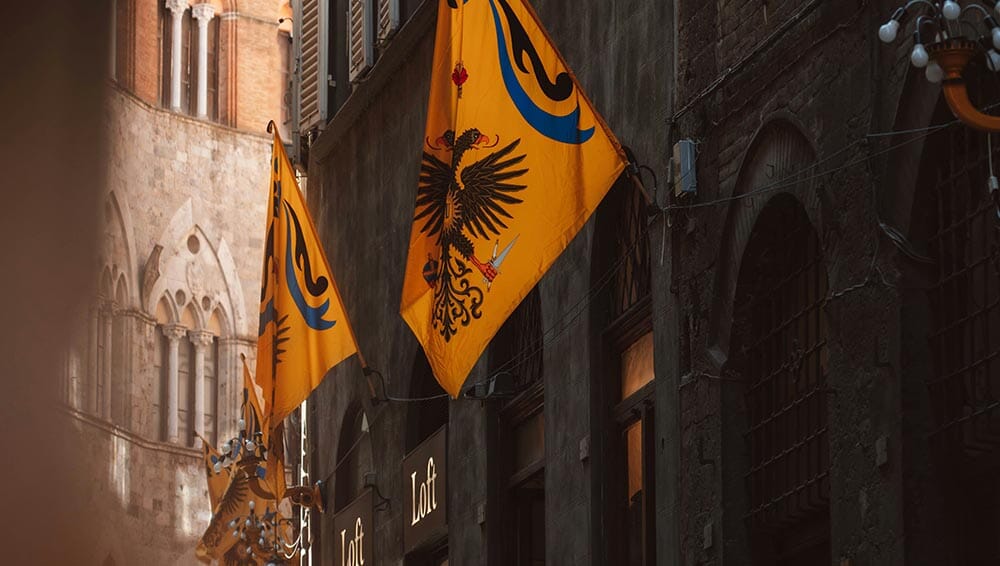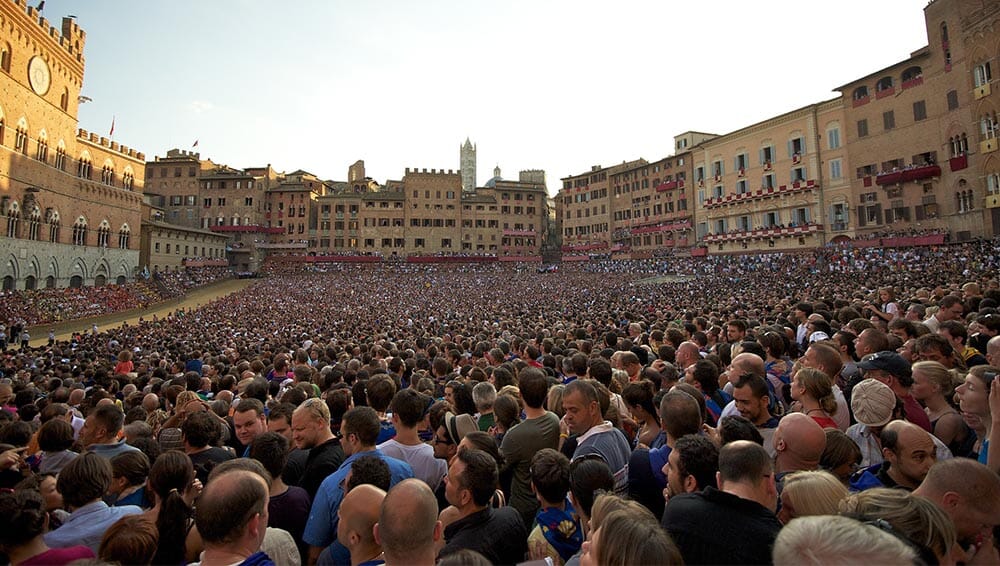The
Palio, which takes place in the picturesque
Piazza del Campo in Siena, is one of the most fascinating historical and cultural events in Italy. This ancient horse race, with roots dating back to the Middle Ages, is an extraordinary event that attracts tourists and enthusiasts from all over the world. Each year, the Palio is held in two editions: on
July 2 and
August 16, and represents a moment of great excitement and competition for the city and its
contrade.
What is the significance of the Palio di Siena?
The
Palio di Siena is not just a horse race; it is an event filled with historical, cultural, and social significance. The Palio symbolizes the pride and rivalry between the various
contrade (historical neighborhoods) of the city. Each contrada participates with its own horse and
jockey, competing not only for victory but for honor and glory. The
drappellone, the valuable hand-painted banner awarded to the winner, is the coveted trophy that represents the triumph and pride of the contrada.

How is the Palio di Siena celebrated?
The
Palio di Siena celebrations begin days before the actual race. The city comes alive with religious ceremonies, contrada dinners, and trial races. On the day of the Palio, the city gathers in
Piazza del Campo, where the spectacular
Corteo Storico parade takes place. Participants, dressed in medieval costumes, parade through the city streets, carrying flags and symbols of the contrade. The race itself is brief but intense: the horses must complete three laps of the piazza in a race that lasts just a few minutes but can change the fate of a contrada.

When is the Palio di Siena held?
The
Palio di Siena is celebrated twice a year: on
July 2, in honor of the
Madonna of Provenzano, and on
August 16, in honor of the
Assumption of Mary. These dates are fixed and represent two crucial moments in the Sienese calendar. During these days, Siena transforms into an open-air theater, where history and tradition come to life in a vibrant and engaging manner.
The Palio di Siena: the contrade
Siena is divided into
17 contrade, each with its own identity, history, and traditions. Each contrada is represented by a specific symbol and colors. The contrade that participate in the Palio are ten, selected by rotation and drawing. This division of the city into contrade not only fuels competition during the Palio but also strengthens the sense of community and belonging among the Sienese, a tradition passed down through generations.

Why is winning the Palio di Siena important?
Winning the
Palio di Siena is the highest honor for a contrada. The victory brings prestige, pride, and a strong sense of belonging. The
drappellone, awarded to the winner, is a symbol of success that will be proudly displayed for years. The victory is celebrated with
festivities that can last for weeks, consolidating the bond among contrada members and reinforcing their collective identity.
Who is the jockey with the most Palio di Siena victories?
The
jockey with the most Palio victories in history is
Andrea Degortes, known by the nickname "Aceto." Degortes achieved
14 victories between 1964 and 1996, becoming a living legend of the
Palio di Siena. His skill and courage in the race have made him one of the most beloved and respected figures in the history of this competition.

How much does the winner of the Palio di Siena earn?
The winning jockey of the Palio di Siena receives a compensation that can vary, but beyond the monetary prize, the greatest value is the
prestige and honor that victory brings. The compensation can range
from 10,000 to 50,000 euros, depending on the agreements with the contrada. However, the immaterial benefits, such as fame and respect, often far exceed the economic value of the prize.
Visiting Siena during the Palio
Visiting
Siena during the
Palio is an unforgettable experience that offers a unique immersion in the history, culture, and traditions of Siena. The vibrant atmosphere, colorful celebrations, and thrilling competition make these days a special opportunity to get to know and experience the authentic soul of Siena. The Palio is an event that goes beyond the simple horse race; it is a celebration of the identity and passion of an entire city. For anyone who loves Italian history, culture, and traditions, attending the Palio di Siena is a must-see event.
